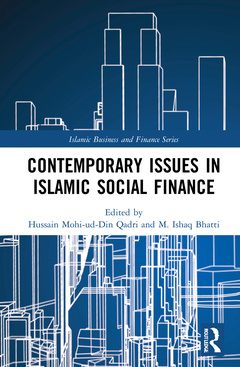Contemporary Issues in Islamic Social Finance Islamic Business and Finance Series
Coordonnateurs : Qadri Hussain Mohi-ud-Din, Bhatti M. Ishaq

The development of Islamic banking and finance (IBF) previously centred around three regions of the world: the Middle East, Southeast Asia, and South Asia. However, in recent years, this has expanded, as interest in IBF has gained momentum in Australia, the USA, and Europe, especially in the UK. Several Western market players have established their own Islamic window or subsidiaries to cater to the need of growing Muslim populations in these regions.
This book examines the recent developments in IBF, particularly in the context of Islamic social finance instruments, such as Islamic microfinance, halal education, takaful, mutual funds, and waqf. It covers the religiosity, spirituality, and tawhid index, which promotes social well-being and empowerment. The book is interdisciplinary, and theories, practice, and key issues are presented simultaneously, introducing new ideas and techniques to the IBF community. Moreover, the book examines topics such as innovation in Islamic social finance instruments, advanced techniques of risk mitigation in Islamic capital markets, marketing and the halal industry, and shari?ah-compliant instruments, which are critical to Islamic finance.
The book is an essential reference text for academics and research students at the master?s and doctorate levels in IBF.
1: Contemporary Issues in Islamic Socio-finance 2: Implications of profit-sharing investment accounts on the capital structure of Islamic bank: a comparative study 3: Tawhid index of global wellbeing as the principal indicator of spirituality and development 4: Risk management and risk sharing in Islamic finance: theory and practice 5: Debt, Risk and Islamic Moral Economy 6: Role of state Banks Policy rate in the economy of Pakistan 7: Religion, Culture and Islamic Marketing 8: A theoratical model for job creation: The role of Banks 9: Lessons from the UK’s dedicated Islamic banks 10: Inclusive and sustainable growth with Islamic Finance 11: Embracing Islamic Banking as a new Engine towards the Growth of Economy 12: The role of Zakat in addressing poverty: An analysis of Sokoto State Zakat and Waqf (endowment) Commission 13: Analysis of sources and uses of charity fund account: A case study of Meezan Bank 14: Issuance of musawwamah based card by islamic banks as an alternative to credit card 15: The Socio-Economic Impact of Waqf in Islam: A study of Zakkat and Endowment Commission in Sokoto State 16: Business Zakat Reporting: Evidences from the Islamic Financial Institutions 17: The Blueprint of Pre-Higher education pragramme: A platform to uplift the B40 Economics position 18: An increasing Demand for Halal products and services: A call for an enactment of international convention on Halal Industries 19: Education for Young Generations on Halal Food Audit and Certification: Challenges and Future Aspects 20: Halal Tourism optimization to economic Growth: Study at Jakarta Indonesia 21: Do best by providing quality services: A case study towards Islamic Banking and customer behaviour 22: Green Sukuk for Financing Renewable Projects in Islamic Social Finance: Problems and Solutions 23: Conclusion on Contemporary Issues in Islamic Socio-finance
Hussain Mohi-ud-Din Qadri is Deputy Chairman of the Board of Governors of Minhaj University, Lahore, and Associate Professor at the School of Economics and Finance, Minhaj University, Lahore, Pakistan.
M. Ishaq Bhatti is a Professor of Finance and Financial Econometrics and the Founding Director of the Islamic Banking and Finance Programme at Latrobe University, Australia.
Date de parution : 05-2023
15.6x23.4 cm
Date de parution : 08-2021
15.6x23.4 cm
Thèmes de Contemporary Issues in Islamic Social Finance :
Mots-clés :
Islamic Social Finance; Islamic Banking; Islamic Finance; Islamic Microfinance; Full Fledged Islamic Banks; Shariah compliant instruments; Conventional Banks; Waqf; Halal Industry; mutual funds; Halal Tourism; Takaful; Halal Products; Halal education; Halal Certification; IBF Australia; IFIs; IBF and the West; Halal Food; Islamic Mutual Funds; Religiosity; Spirituality and Tawhid index; Sokoto State; Tawhid; Muslim Consumers; innovation in Islamic social finance; Halal Logo; risk mitigation; Rab Al Mal; Islamic capital markets; Halal Food Products; Dubai Islamic Bank; Islamic Moral Economy; Abu Hurairah; Islamic Financial System; Islamic Marketing; Halal Standards; MCB



